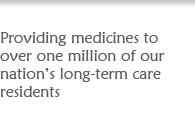State by State Analysis of Medicare Part D Finds Low-Income
Nursing Home Residents Have a Poor Chance of Being
Enrolled in the Best Available Drug Plans
Most Could Be Enrolled in a Better Plan at No Cost
If They Were Allowed to Receive Help From Their Caregivers
Washington -- An analysis released today by the Long Term Care Pharmacy Alliance (LTCPA) finds most low-income nursing home residents have a poor chance of being enrolled in the Medicare Part D plan that best covers their medications – and most could immediately switch to a better plan at no cost if they were allowed to receive help from their caregivers.
Under the Medicare Part D prescription drug program, low-income nursing home residents who are “dual eligible” for both Medicare and Medicaid are qualified to have their medicines covered at no cost as long they are enrolled in one of several drug plans recognized as “below benchmark” in cost by the federal government’s Centers for Medicare & Medicaid Services (CMS). These “Duals” represent about two-thirds of the nursing home population.
The LTCPA analysis finds those below benchmark cost plans vary greatly in terms of the drugs they cover and the restrictions they put on access to those medicines. Using the online plan finder CMS provides to beneficiaries to evaluate drug plans, LTCPA compared how below benchmark cost plans covered 10 drugs commonly prescribed to long-term care residents. The results varied dramatically from very good to very poor.
In New York, for example, there are roughly 80,000 low-income nursing home residents who can choose to be enrolled in any of 13 below benchmark cost plans.
- 3 of those 13 plans cover all 10 drugs, and have restrictions such as requiring prior authorization or step therapy on only one drug.
- 10 of those 13 plans do not cover all drugs, with 2 of the plans not covering 4 of the 10 drugs; and have restrictions such as requiring prior authorization or step therapy on an additional 4 drugs.
No single drug plan is best for all nursing home residents all the time. Recognizing that, the Part D program allows low-income nursing home residents to choose among any below benchmark plan, and to switch plans monthly in order to guarantee the best coverage. In spite of the ability to select and change plans, few frail elderly nursing home residents do so. Because nursing home residents are typically very elderly and in poor physical and mental health, most lack the ability to evaluate, choose and enroll in a Part D plan on their own.
To ensure nursing home residents receive some drug coverage, the federal government automatically assigns a plan to all low-income beneficiaries who fail to choose one on their own. Those beneficiaries are evenly – and randomly – distributed among all below benchmark cost plans in their region. That assignment is made without any attempt to match beneficiaries to the plan that best covers their drugs. As a result, while all regions have below benchmark cost plans available to cover all or most of a beneficiary’s medicines with few restrictions, the odds are poor that they will be randomly assigned to that particular plan.
Making things worse, it is current federal policy that “under no circumstances should a nursing home require, request, coach or steer any resident to select or change a plan for any reason.” The same prohibition has been applied to other caregivers including pharmacists, nursing home staff and physicians.
“Hundreds of thousands of frail low-income nursing home residents in this country only need a little help to be enrolled in a Part D plan that better covers their medications. Yet, they are denied having the people they trust to care for them – their nurses, physicians and pharmacists – give them that help,” said LTCPA Executive Director Paul Baldwin. “It is unreasonable and unacceptable that so many nursing home residents are stuck in drug plans that don’t fully cover their medicines when the only thing standing in their way is bad federal policy. Their health should not be left to random chance.”
A copy of the full report is available at ltcpa.org . The report includes state by state data for all 50 states and the District of Columbia.
The Long Term Care Pharmacy Alliance represents pharmacies that specialize in providing medicines to over one million of the nation’s long-term care residents. LTCPA representatives are available for interviews and to discuss the report.


